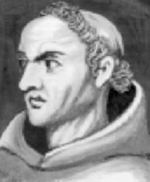 Ideas
Ideas
– Nominalism rejects the view that there are universals (essences) in things; it emphasizes the experienced world of contingent beings.
– The name used for a thing does not capture the essence of the thing, but is simply a conventional sign used to refer to the thing.
– Logic seeks to organize and clarify human thought.
– Intuitive cognition is a certain grasp by sense and judgment of any particular being, while abstractive cognition based on intuitive cognition organizes many similar things under universal terms (names).
– Ockham’s razor is the principle of economy in theorizing; it calls for the least number of assumptions in the construction of an explanation.
– God is known by faith in his revelation, not by reason examining his creation.
– Creation and salvation are the manifestations of the divine will that call each person to a covenant partnership.
– The claim of the papacy to be supreme over the secular realm is to be rejected.
– The gospel law is the law of freedom.
Biography
William of Ockham was a Franciscan friar and philosopher, from Ockham (near Ripley, Surrey), England.
William devoted to a life to extreme poverty and minimalism. A pioneer of nominalism, some consider him the father of modern epistemology and modern philosophy in general, because of his strongly argued position that only individuals exist, rather than supra-individual universals, essences, or forms, and that universals are the products of abstraction from individuals by the human mind and have no extra-mental existence. Ockham is also considered one of the greatest logicians of all time.
Dave Beckett of the University of Kent at Canterbury writes:
“The medieval rule of parsimony, or principle of economy, frequently used by Ockham came to be known as Ockham’s razor.”
Summoned to Avignon in 1324 by Pope John XXII on accusation of heresy, William spent four years there in effect under house arrest while his teaching and writing were being investigated.
During this period, at the request of Brother Michael of Cesena, head of the Franciscan order, Ockham investigated the controversy between the Franciscans and the Papacy on the doctrine of apostolic poverty, which was central to Franciscan doctrine but anathema to the Pope.
Ockham concluded that Pope John XXII was a heretic, a position that he later put forth in writing. Before a conclusion was reached about the heresy or orthodoxy of William’s philosophy, he fled Avignon on May 26, 1328 with Michael of Cesena and a few other friars.
They sought the protection of Emperor Louis IV in Bavaria. After criticizing the pope, he is believed to have been excommunicated, although historical sources vary. Ockham spent much of the remainder of his life writing about political issues, including the relative authority and rights of the spiritual and temporal powers.
He died in a convent in Munich, Bavaria (now Germany).
Major Works of William of Ockham
BEFORE 1324:
– The Sum of All Logic
– Exposition on the Book of Porphyry’s Introduction to Aristotle’s Categories
– Exposition on th Book of Predicates
– Compendium of Logic
– Exposition on the Eight Books of Physics of Aristotle
– Commentary on the Sentences of Peter Lombard and Reportatio
– Seven Discussions on Anything and Everything
– On the Sacrament of the Altar
– Predestination
– God’s Foreknowledge
– Future Contingents
AFTER 1324:
– The Work of Ninety Days
– Compendium of Errors of Pope John XXII
– Eight Questions Concerning Power and Dignity of the Pope
– Dialogues Between Master and Disciples upon the Power of Emperors and Popes

 Ideas
Ideas
Could ve swaned that was what really passed off , precisely did nt have the will to research it, thanks for working the mystery .
It’s really a nice and helpful piece of information. I’m glad that you shared this helpful info with us. Please keep us informed like this. Thanks for sharing.
Thank you, wonderful job! This was the information I had to have.
These kind of post are always inspiring and I prefer to check out quality content so I happy to find many good point here in the post, writing is simply great, thank you for the post